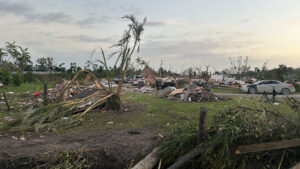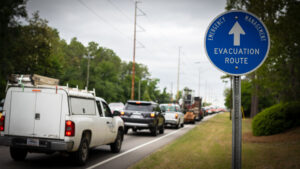This article originally appeared on Inside Climate News, a nonprofit, non-partisan news organization that covers climate, energy and the environment. Sign up for their newsletter here.
By Kiley Bense, Inside Climate News
With Atlantic hurricane season upon us, experts warn that the Trump administration’s anti-immigration policies have exacerbated existing risks for undocumented people weathering disasters in the United States.
After California, the states with the largest populations of undocumented immigrants are Florida and Texas, both hurricane hot spots.
“In emergency management, people who are undocumented are generally considered one of the more vulnerable populations when it comes to disasters,” said Samantha Montano, an assistant professor of emergency management at the Massachusetts Maritime Academy.
Undocumented people are ineligible to receive individual cash assistance from the Federal Emergency Management Agency, they often face language barriers to accessing emergency alerts and they’re more likely to live in low-cost housing, like mobile homes, that are particularly unsafe during extreme weather.

President Donald Trump’s funding cuts, anti-immigrant rhetoric and crackdowns from Immigration and Customs Enforcement agents “will make all of it worse,” Montano said. The administration’s policies will increase the chances that lives will be lost and recovery will be slower this hurricane season, she said.
“One of the underpinnings of having an effective response to a disaster is trust, and clearly the government has lost any trust that it had with undocumented people,” Montano said.
When disasters hit this year, “undocumented people are going to be on their own,” Montano said. “They’re going to have to depend on their own communities for help.”
FEMA did not respond to questions from Inside Climate News about undocumented people and the involvement of ICE in disaster relief. In a statement, a FEMA spokesperson said that “the Trump administration is committed to ensuring Americans affected by emergencies will get the help they need in a quick and efficient manner.”
“All operational and readiness requirements will continue to be managed without interruption in close coordination with local and state officials ahead of the 2025 Hurricane Season,” the statement said.
Even before the new administration entered the White House, fears that FEMA-sanctioned disaster shelters were not safe from ICE raids were common. FEMA is part of the Department of Homeland Security, which also houses ICE. “It’s really dangerous for somebody who’s undocumented to try and seek help during a disaster, even if not seeking help is also just as dangerous,” Montano said.
Research conducted following Hurricane Harvey in 2017 showed that some undocumented residents didn’t evacuate because they feared deportation. In this new climate of heightened alarm, these groups will be even less likely to seek help in an emergency.
“The level of fear in the community has dramatically increased,” said Ahmed Gaya, director of the Climate Justice Collaborative at the National Partnership for New Americans, a coalition of immigrant and refugee rights organizations.

Language barriers pose another risk: If you don’t speak English fluently, you may not have access to weather warnings and evacuation orders. “Few states and communities have culturally appropriate and in language programs focused around information and disaster preparedness to immigrant communities,” Gaya said.
At an outreach event earlier this year, Gaya said people told him they had no warning of the advancing wildfires in California because they don’t listen to English language radio or television. He has heard similar stories about people in the path of tornadoes.
“Their surviving family members told me they received no warnings that they were under an evacuation order,” he said, of one family who lost their lives in a mobile home in Tennessee. According to the American Immigration Council, 27 percent of Florida’s foreign-born population is not proficient in English. That’s more than 1 million people.
“That language access persists into the recovery process,” Gaya said. Funding and grant cuts made by the administration to FEMA, which provides interpretation services, and to local aid organizations that work with immigrant communities, will make bridging those gaps more difficult.
Although undocumented people are not eligible for cash assistance from FEMA, they may be eligible for other kinds of help, like food and water, shelter, legal services and crisis counseling. If they live in a mixed-status household, they can apply for assistance on behalf of a child who is a U.S. citizen. But in an atmosphere of increased mistrust and inaccessibility, experts said, people will be less likely to seek government aid.
A FEMA memo divulged in a court filing said the agency was reviewing “all disaster relief programs that may indirectly or incidentally aid illegal aliens,” including aid provided by nonprofit groups, Politico reported in March.
In a proclamation for National Hurricane Preparedness Week, Trump said he remains “steadfastly committed to supporting hurricane recovery efforts and ensuring that Federal resources and tax dollars are allocated to American citizens in need.”
In January, in an executive order about FEMA, Trump claimed the agency spent “over a billion dollars to welcome illegal aliens.” This is not true. But it highlights the administration’s hyperfocus on immigrants in all aspects of the federal government’s work.
Both Gaya and Montano warned that things are likely to get worse as the U.S. enters the “danger season” of increased hurricanes, wildfires and heat waves.
“The wildfires in California and the extreme devastation that we’ve seen in the first weeks of 2025 are merely a harbinger of what we are expecting to come this year,” Gaya said.
Banner photo: Cots laid out in 2017 at the Sterling Pruitt Activity Center in Beaumont, Texas, for residents who lost their homes during Hurricane Harvey (Photo by Staff Sgt. Nicolas A. Cloward/128th Mobile Public Affairs Detachment, via Defense Visual Information Distribution Service).
Sign up for The Invading Sea newsletter by visiting here. To support The Invading Sea, click here to make a donation. If you are interested in submitting an opinion piece to The Invading Sea, email Editor Nathan Crabbe at nc*****@*au.edu.



